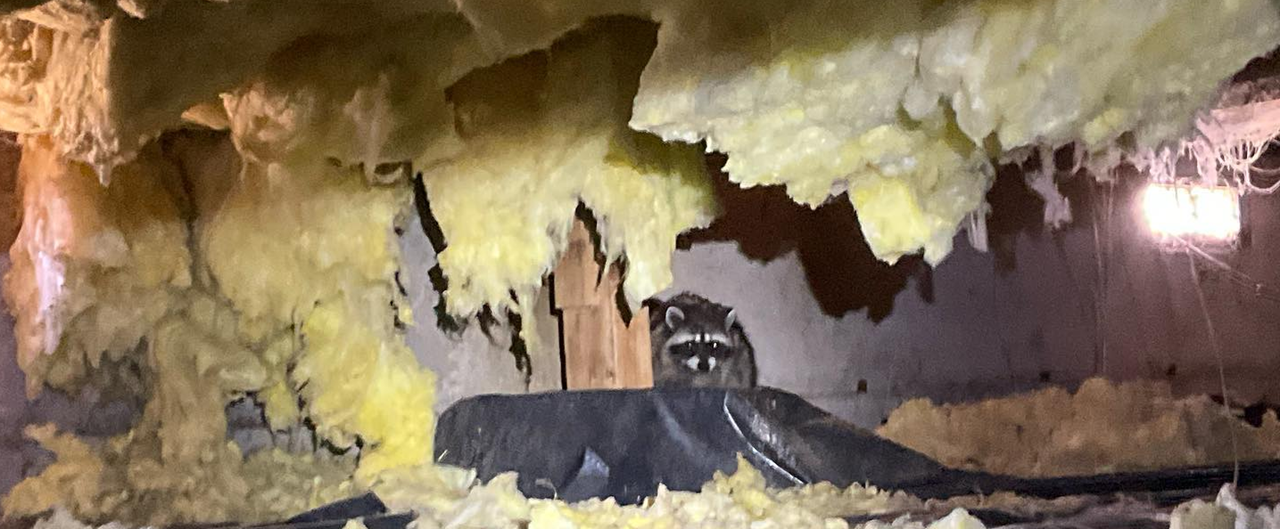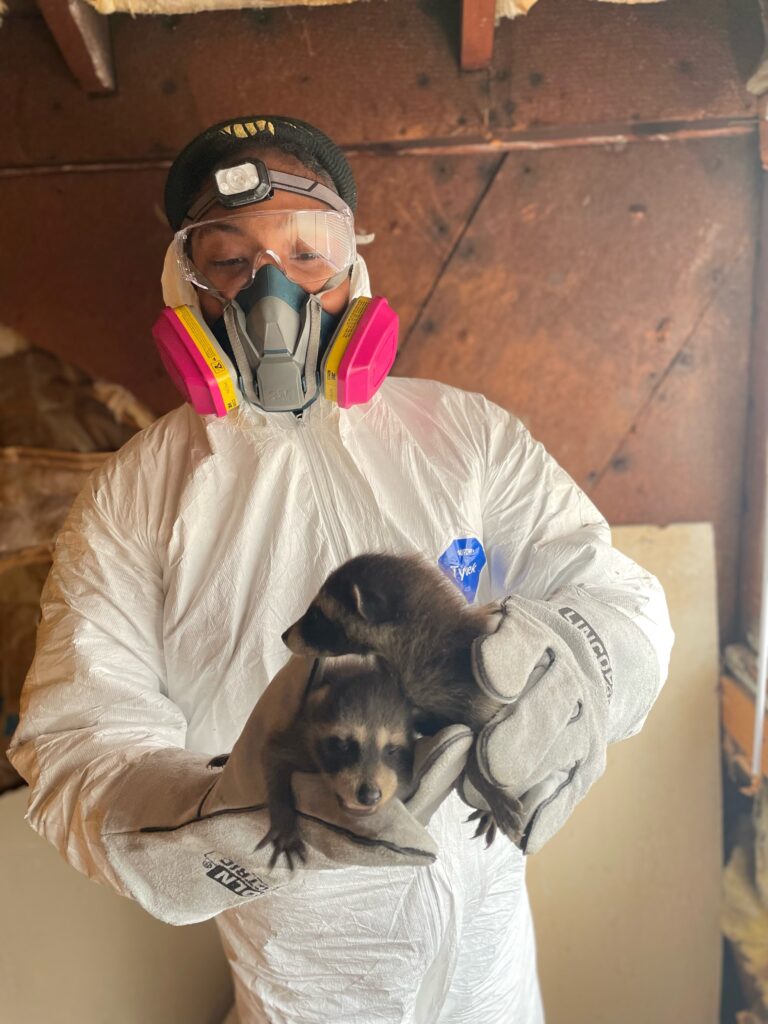
Need Help with Raccoon Infestation?
Find a Critter Control near you.
Raccoons adapt very well to living near humans and will find places on your property to create a nesting area, give birth to young, and escape the outdoor elements. One of their favorite places is your basement. Raccoons, nocturnal wildlife, sneak into your basement through cracks, holes, or open doors.
Raccoons in basements can lead to costly damage and health hazards for you and your family. Trying to get them out of your basement poses additional dangers. However, with the help of professional removal services, raccoon removal will get rid of your problem quickly and effectively.
Signs You Have Raccoons in Your Basement
Raccoons in basements leave many audible, visible, and foul-smelling signs. Although you may not notice them immediately, they can cause health problems for anyone in the home. If you think you have signs of a raccoon living in your basement but aren’t sure, contact a professional to perform a thorough inspection and create a plan to remove it.
What Do Raccoons in Basements Sound Like?
As raccoons are nocturnal, their vocalizations are louder and more frequent during evening hours. While you are trying to fall asleep after a long day, raccoon sounds become apparent.
Some of the more apparent signs of a raccoon in the house are the noises they make, which can be over 200 types, including the following common ones you may hear in your basement:
- Squeaking
- Shuffling
- Hissing
- Chirping
- Growling
- Smacking on food
- Chittering
- Whimpering
- Squealing like a baby
- Mewing
- Crying
- Rummaging through boxes or stored items
Do Raccoons Like Basements?
Raccoons choose basements for safe, warm places to take shelter. They have predators, so they find places that protect them from becoming prey. Basements are a perfect spot for raccoons to create a den where they can give birth and sleep safely during the day. Basements are also places where they can bring items from the outdoors inside.
Common basement entry points include:
- Gaps where utility cables and pipes run into homes
- Holes near building foundations
- Open vents
- Furnace chimneys
- Open doorways
- Pet doors

If you have partially broken windows, doors, or vents, raccoons will break them more to enter your basement. Their dexterous hands act like human hands, pulling, pushing, turning, and punching.
Dangers of Having Raccoons in Your Basement
Once raccoon infestations in basements are established, the pests cause extensive damage by entering and exiting den areas in search of food. The widening of existing holes weakens homes’ foundations.
Depending on what you store in your basement, raccoons will likely rummage through and scatter it. If you store trash, recycled items, pet food, or sentimental items, raccoons will likely search for food or nesting materials and take what they need.
Raccoons also carry many diseases that are harmful to humans. Some can even be fatal. Fortunately, there are several ways to prevent the dangers of raccoons in basements, like trapping, removal, and exclusions that wildlife technicians provide.
Can Raccoons Cause Damage Under the House?
If raccoons live on your property, they will find ways to access the underneath sections of your home, inside and outside your basement.
Raccoons destroy the following in basements:
- Insulation
- Drywall
- Pipes
- Plumbing
- Electrical wires
- Ductwork
- Wood boards
Unknown to you, your home may have fire and water hazards caused by raccoons. It is crucial to get a professional to inspect the underside of your home for potential damages.
Do Raccoons Carry Diseases?
Raccoons carry diseases in several ways, including their feces, fur, and bodily fluids that put you and your pets at risk. When raccoons feel threatened or cornered, they may lash out through biting, scratching, and clawing. Bacteria under their fingernails and in their saliva can transfer. Also, many known parasites, such as ticks, fleas, and mites, live in their fur.
If you find latrines, they are a sure sign that raccoons are in the house. Latrines are restroom areas where raccoons pile their feces and urine. Raccoon feces is distinctive and easy to spot, as it is tubular with blunted ends. Depending on how long they have been living in your basement, the piles can be large, damaging your floors and walls. Raccoon droppings are hazardous, as feces contain raccoon roundworm, which is fatal to humans.
Diseases associated with raccoons include the following:
- Rabies, which is spread via saliva
- Raccoon roundworm, also known as baylisascaris, is a fecal parasite
- Leptospirosis, a bacteria spread via excrement
- Giardiasis, a painful gastrointestinal ailment
- Salmonellosis, a bacteria that causes abdominal pain and diarrhea.
Getting rid of raccoons in basements must be done with safety equipment to avoid any of the dangers they present.
How to Get Rid of Raccoons in Basements
Removing raccoons in basements must be a priority so you, your family, and your property remain safe. Several safe, humane, and effective ways can be used to remove raccoons. Examples include deterrents, trapping, habitat modification, and working with wildlife professionals.
It is important to note that raccoons are considered small fur-bearing animals that, in most states, require permission before you can trap and remove them from your home. This is another reason hiring wildlife control experts is a good idea. Not only do they have permits, but they also understand the local laws so that you can avoid accidental legal issues.
Raccoon Deterrents
Many homeowners try raccoon deterrents to scare raccoons away from their property. Many factors contribute to how well deterrents work. Common deterrents include:
- Predator urine
- Ammonia
- Cayenne pepper
- Loud music
- Windchimes
- Predator calls
- Barking dogs
Frightening devices paired with different lighting can discourage raccoons from staying in basements. However, raccoons are clever and can become used to new smells, lights, and sounds. Deterrents and repellents may be effective initially but are ineffective in keeping raccoons away for good.
Professional Raccoon Removal
Professional wildlife removal experts understand how to identify raccoon activity, the damage they cause, repairs, and how to keep raccoons away from your basement. Most importantly, they use safe and humane equipment to protect you and the fur-bearing animal. Remember, raccoons carry many diseases that are transferrable to you and your loved ones, including your pet.
Occasionally, a raccoon living in your basement will give birth to multiple young pups, requiring even more knowledge and expertise to remove them correctly and legally. Wildlife control technicians can resolve your raccoon problem and prevent future problems.
Raccoon Prevention and Habitat Modification
Habitat modification helps keep raccoons out of basements. It involves changing your home and property so that raccoons will not find them attractive. Raccoons search for food, water, and shelter. If a raccoon is living in your basement, it has shelter. Since raccoons often choose to live near food sources, your property likely offers a good selection. Therefore, you must eliminate the things that raccoons desire.
Professional wildlife controllers may refer to habitat modification and prevention as “exclusions,” which include the following techniques:
- Sealing off any potential entrances
- Capping furnace chimneys
- Blocking areas under porches and decks
- Enclosing crawl spaces
- Securing trash cans and pet food containers
- Removing bird feeders
- Protecting gardens
- Eliminating standing water sources
- Installing barriers
Even if you don’t currently have a raccoon problem, it is a good idea to consider adding these prevention and habitat modifications. Allowing professionals to implement a few practical measures can save you time and money.
Call Expert Raccoon Removal Services Today
Critter Control has been in the pest and raccoon removal business for over forty years. We have a proven three-step treatment plan that involves providing you with a comprehensive inspection, removing raccoons in basements, and implementing exclusions to protect your home from future raccoon invasions.
Raccoon removal can be filthy and dangerous, so our technicians use the safest and most humane gear and equipment. They receive ongoing training, maintain certifications, and know how to comply with local and state laws when removing wildlife.
Contact your local Critter Control provider today for all your prevention or intervention needs.
Get them out.
Keep them out.®
Experiencing a wildlife or pest issue? We can help! Complete this form and your local Critter Control® office will contact you to assist.
- How to Get Rid of Raccoons
- Are Raccoons Dangerous?
- Raccoon Trapping Service
- Raccoon Control
- Baby Raccoons
- Dead Raccoon Removal
- Raccoon Diseases
- Do Raccoons Hibernate in Winter?
- Raccoon Damage
- Raccoon Diet
- Raccoon Poop
- Raccoons In Yards
- Raccoons in Chimneys
- Raccoons in Crawl Spaces
- Raccoons in Houses
- Raccoons in Trash
- Raccoons in Trees
- Raccoons in Walls
- Raccoons on Roofs & in Soffits
- Raccoon Sounds
- Raccoon Tracks
- Raccoons in Attics & Ceilings
- What Does a Raccoon Look Like?